Ever wanted to test out a product without the commitment?
A free trial lets you explore all the features to see if it’s the right fit before spending a dime.
In this guide, I’ll explain everything you need to know about free trials, from what is free trial, their types to tips on making the most of them.
Curious to find out how free trials can help you make smarter choices? Let’s dive in!
What is a Free Trial? (Free Trial Definition)
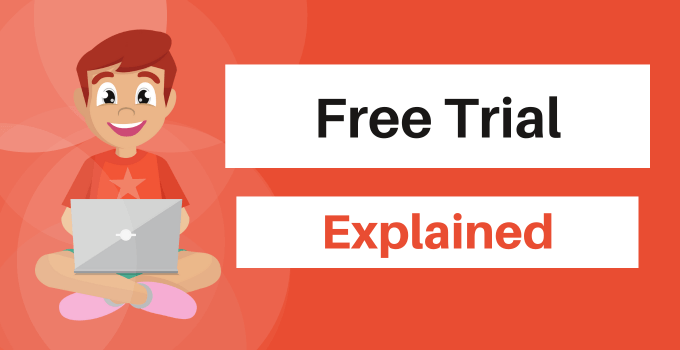
A free trial is a limited-time offer that allows you to try a product or service for free.
Companies often use free trials to attract potential customers, giving them a chance to experience the product before deciding if it’s the right fit.
From streaming services to software apps, free trials have become super popular across many industries, and they’ve changed how we make purchasing decisions.
Whether it’s a new app, streaming service, or online course, a free trial helps you feel more confident in your choices.
How Free Trials Work?
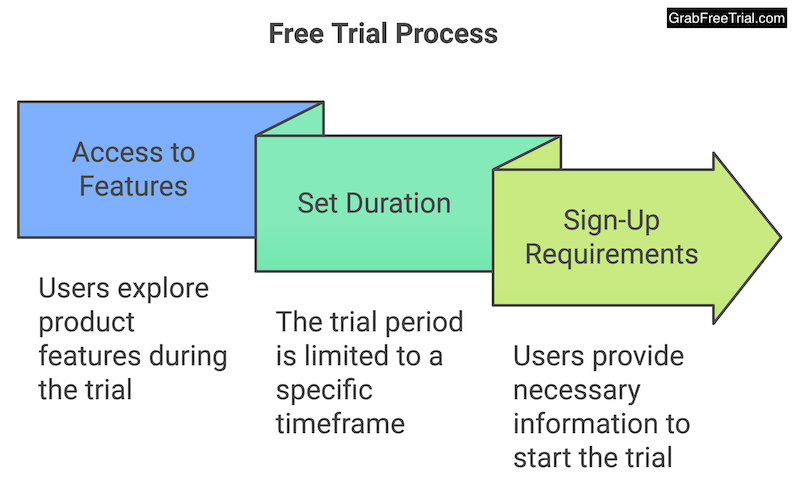
So, how does a free trial actually work? Here’s a quick info:
- Access to Features: During the trial, you often get to explore the product’s main features, sometimes even the premium ones.
- Set Duration: Most free trials are time-based, like 7, 14, or 30 days. This means you only have a limited time to see if the product meets your needs.
- Sign-Up Requirements: Some trials require you to sign up with an email, while others might ask for payment info (more on this below).
By the end of the trial, you’ll have a solid understanding of whether the product is worth your investment or not.
Benefits of Free Trials
Why should you care about free trials? Well, here are some reasons free trials are a win-win:
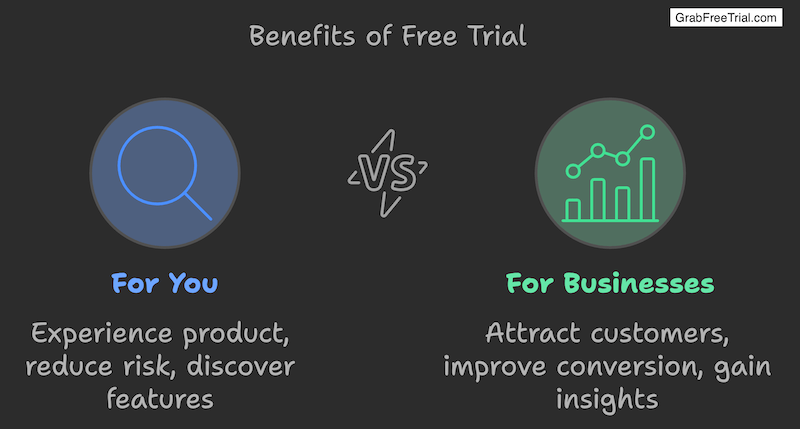
For You:
- Try-Before-You-Buy: You get hands-on experience, helping you decide if it’s the right fit before spending any money.
- Reduce Purchase Risk: No one likes wasting money on a product they don’t end up using. A trial lets you test the waters.
- Discover Product Features: Get familiar with the product’s features and see if they match your needs.
For Businesses:
- Attracting New Customers: A free trial brings in potential customers who might be on the fence.
- Better Conversion Rates: People who try out a product are more likely to become paying customers.
- Insights into User Behavior: Companies get a peek at how users interact with their products, which can help improve the product in the future.
A recent study shows that the average rate of trial-to-paid conversion is above 20%.
Types of Free Trials
Free trials aren’t one-size-fits-all.
There are several types, and each offers a unique experience.
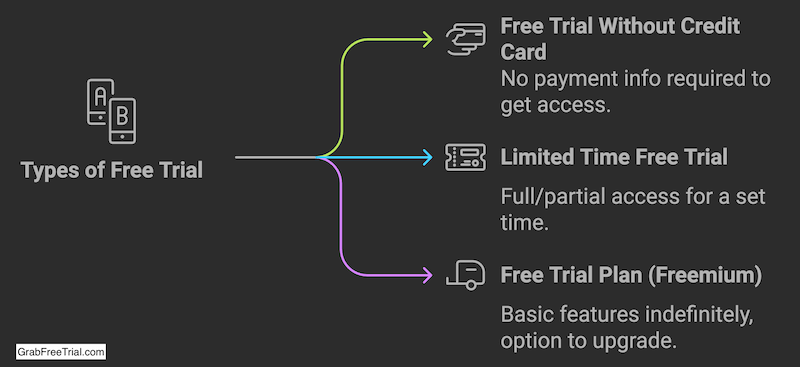
Here are some of the most common ones:
1. Free Trial Without Credit Card
This type lets you dive right in without sharing your payment info.
It’s perfect for those who are cautious about being charged later on.
You just need to sign up, explore, and decide if you like it without any strings attached.
It’s also known as Risk-free trial which is better than Default free trial.
2. Limited Time Free Trial
This is a more traditional setup, where you get full or partial access for a set time, like 7, 14, or 30 days.
You’ll want to dive into all the key features during this period to see if the product truly delivers what you’re looking for.
3. Free Trial Plan (i.e. Free Plan)
Sometimes called a “freemium” model, a free plan offers basic features indefinitely but with the option to upgrade for more advanced tools.
Think of it as a lightweight trial that keeps going, but with fewer bells and whistles.
This way, you can use the product without time constraints and see if you want to upgrade the paid plans.
Free Trial Policies and Terms to Watch For
When you sign up for a free trial, it’s essential to read the terms and policies, especially if payment info is required upfront.
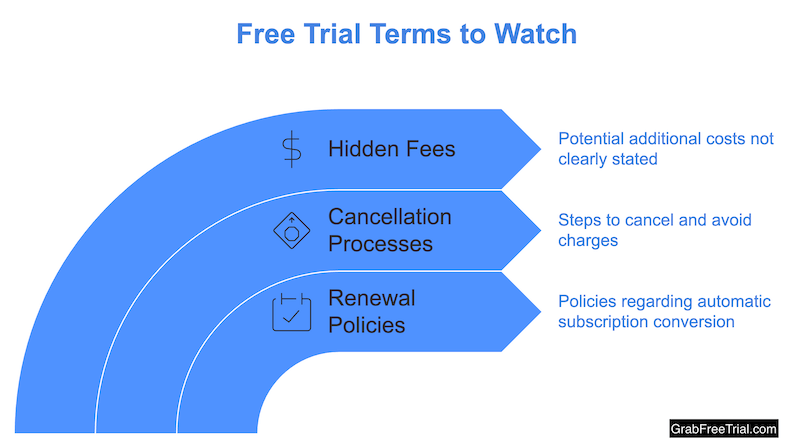
Here’s what to keep an eye on:
- Renewal Policies: Many trials automatically convert into a paid subscription once the trial period ends, so be sure to check if cancellation is necessary.
- Cancellation Processes: If you don’t want to continue, know the steps to cancel and avoid unexpected charges.
- Hidden Fees: While rare, some services may have fees attached to certain trial options. Always read the fine print to avoid surprises!
If you want to know more then read our pros and cons of free trial article.
Tips for Making the Most of a Free Trial
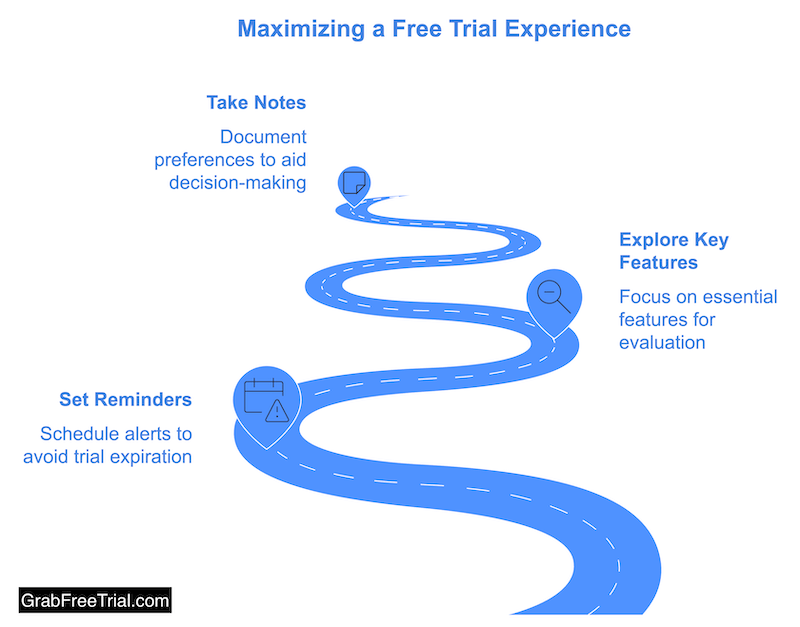
Want to make sure you’re getting everything you can from a free trial? Here’s how:
- Set Reminders: It’s easy to forget when a trial ends, so set a calendar reminder a day or two before.
- Explore Key Features: Focus on the main features you’ll use, so you can get a feel for the product’s true value.
- Take Notes: Track what you like or dislike. This will make it easier to decide if it’s worth paying for.
Common Misconceptions About Free Trials
There are a few myths that come up around free trials. Let’s clear them up:
- It Cancels Automatically: Many trials automatically renew, so check the cancellation policy if you don’t want to be charged.
- Free Plan vs. Free Trial: A free trial gives you temporary access to all features, while a free plan often provides ongoing, but limited, access.
- No Data Collection: Many companies track usage during the trial to help improve the product, so don’t be surprised if they collect some data.
Common FAQs
What is a free trial?
A free trial lets you test a product or service for a limited time at no cost. It’s a chance to explore features and see if it’s the right fit before buying.
Do I need a credit card for a free trial?
Some free trials need a credit card for easy transition to a paid plan, but many don’t! Always check the sign-up page to see what’s required.
How long do free trials usually last?
Free trials often last between 7 to 30 days, but it varies. Check the trial terms to know how much time you have to explore the product.
Will I be charged automatically after the free trial?
If a credit card is on file, many trials auto-renew. To avoid charges, mark the trial end date on your calendar and cancel if you decide not to continue.
What’s the difference between a free trial and a free plan?
A free trial is time-limited but often gives full access to features. A free plan, or “freemium,” provides basic access indefinitely with an option to upgrade.
Can I cancel a free trial anytime?
Yes! Most free trials let you cancel at any time during the trial period. Just follow the cancellation steps provided to avoid charges.
How can I make the most of a free trial?
Dive into key features, set a reminder for the end date, and test how the product fits your needs. This way, you’ll know if it’s worth subscribing to!
Final Words
Free trials can be a fantastic way to explore products and services without any upfront costs.
By knowing what to expect and taking advantage of the trial period, you can make more informed buying decisions.
So next time you see a free trial for something you’re interested in, give it a shot!
You might just find the perfect product without spending a dime. Happy trialing!